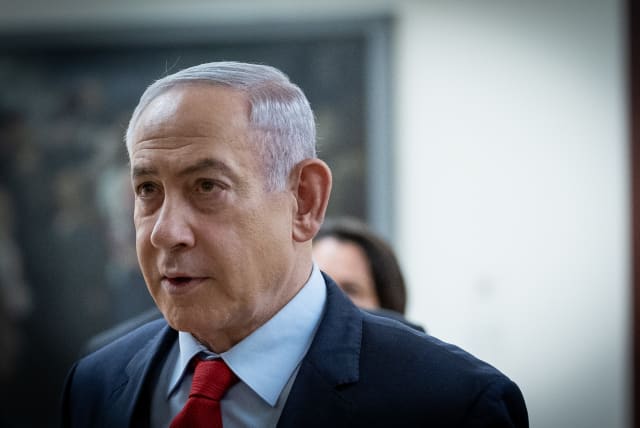Most Israelis support Netanyahu's plan for post-war Gaza, poll finds

New survey reveals Israeli support for Netanyahu's post-war plan in Gaza, with surprising views on achieving 'absolute victory' and international involvement.
A majority of Israelis support Prime Minister Benjamin Netanyahu's "day after" plan for the Gaza Strip and want to see Saudi and Emirati involvement in managing Gaza post-war, according to a new survey by the nonprofit Image of Victory organization.
The survey, conducted among both Jewish and Arab Israelis this month, focused on several topics related to the ongoing Hamas-Israel war.
However, the results also showed concerns about Israel managing to achieve all the objectives of the plan, as well as the definition of "absolute victory" that Netanyahu said he wanted to achieve in Gaza.
Supporting the prime minister's "day after" plan and Saudi and UAE involvement
Netanyahu's "day after" plan, presented earlier this year, consisted of a few objectives. These included:
• Continued Israeli security control over Gaza,
• Establishing a security barrier in the South to stop any smuggling from Egypt,
• Transferring control of Gaza to Palestinian civilians and technocrats, and
• The rehabilitation of Gaza by a foreign power was agreed upon by Jerusalem.
Overall, 62% of Israelis support Netanyahu's plan, with 16% having any actual opposition.
Support for the plan was strongest among older Israelis, with 43.5% of those aged 65 and up fully backing it and 30.4% partially backing it.
In terms of who would help manage Gaza, most Israelis (58%) supported having Saudi Arabia or the United Arab Emirates take responsibility for Gaza's civilians. This point saw widespread bipartisan support, with most right-wing and left-wing voters backing the idea.
This included 55% of Likud and Yisrael Beytenu voters, 50% of Shas, United Torah Judaism, Labor, and Meretz voters, 61% of National Unity voters, and 67% of Yesh Atid voters.
Other countries and entities proposed to help with the "day after" included the US, Egypt, Jordan, Russia, the European Union, the Palestinian Authority, or none of the above. Of these, the United States saw the strongest support among respondents, especially among Israelis in the 65 and over and the 15-24 age brackets (52.2% and 52.5% respectively). Saudi Arabia and the UAE saw the next highest levels of support.
However, while considerable agreement exists in backing Netanyahu's plan, the problem is whether that plan is possible. Less than a quarter (23%) of respondents thought that Netanyahu's plan could be fully realized.
According to a plurality (41%) of respondents, the security goals were the most feasible of the plan's objectives. However, the other objectives were seen as far less likely to be achievable.
Disagreement over "absolute victory" in Gaza
There was significantly less agreement regarding the goal of "absolute victory" in Gaza, as espoused by Netanyahu when the war started.
A large number of Israelis recognize that it has a point, serving the objective of the conflict. But this is not the case across the board, especially among voters in older demographics. In fact, over a third (38%) of Israelis think that "absolute victory" may not even be possible, given Israel's current capabilities.
Interestingly, older demographics (aged 55 and up) were more pessimistic in this regard, while Israelis in the 25-34 age bracket showed the strongest support. But even then, only about a quarter (26.5%) of those respondents showed strong confidence.
There is also disagreement over how "absolute victory" would be achieved, and a quarter of respondents (25%) focused on the social aspects, advocating for the de-radicalization of Gaza's educational, health, religious, and welfare institutions. Slightly more respondents (26%) supported having Israelis resettle in Gaza. Still, others support having another country rehabilitate Gaza.
Two things all respondents agreed on, though, was the need to dismantle Hamas and bring all the hostages back home.
"The survey findings show that there is broad support in Israel for the need for absolute victory in the war," Image of Victory founders Danel Ben Namer and Tal Louria said in a statement.
"However, the questions regarding the ability to achieve it must raise a red flag among Israeli decision-makers," they said. "They must understand that a military decision alone is not enough. Establishing a new civilian administration to replace Hamas is no less important than achieving Israel's military objectives in the war.
"The consensus among right- and left-wing voters regarding the need for the involvement of countries [such as] Saudi Arabia and the United Arab Emirates in managing and rehabilitating the Gaza Strip," they said, "should guide the Israeli government in the direction of achieving civilian objectives on the way to achieving an absolute victory."
Jerusalem Post Store
`; document.getElementById("linkPremium").innerHTML = cont; var divWithLink = document.getElementById("premium-link"); if (divWithLink !== null && divWithLink !== 'undefined') { divWithLink.style.border = "solid 1px #cb0f3e"; divWithLink.style.textAlign = "center"; divWithLink.style.marginBottom = "15px"; divWithLink.style.marginTop = "15px"; divWithLink.style.width = "100%"; divWithLink.style.backgroundColor = "#122952"; divWithLink.style.color = "#ffffff"; divWithLink.style.lineHeight = "1.5"; } } (function (v, i) { });

